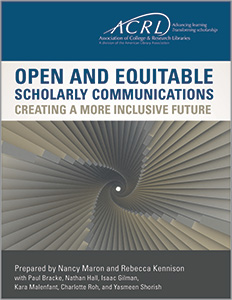Primary tabs
You don't need to be an ALA Member to purchase from the ALA Store, but you'll be asked to create an online account/profile during the checkout to proceed. This Web Account is for both Members and non-Members. Note that your ALA Member discount will be applied at the final step of the checkout process.
If you are Tax-Exempt, please verify that your account is currently set up as exempt before placing your order, as our new fulfillment center will need current documentation. Learn how to verify here.
- Description
- Table of Contents
- About the author
Prepared by Nancy Maron and Rebecca Kennison with Paul Bracke, Nathan Hall, Isaac Gilman, Kara Malenfant, Charlotte Roh, and Yasmeen Shorish
For many years, the academic and research library workforce has worked to accelerate the transition to more open, inclusive, and equitable systems of scholarship. Enacting change in the scholarly communications environment is complicated by a broad range of issues that need to be addressed: the challenges of the global digital divide and information inequality, decolonization, democratization, the politics of technology, privilege (or lack thereof), the public or common good, unbiased policymaking, etc.
Open and Equitable Scholarly Communications is an action-oriented research agenda designed to provide practical, actionable information for academic librarians; include the perspectives of historically underrepresented communities in order to expand the profession’s understanding of research environments and scholarly communication systems; and point librarians and other scholars toward important research questions to investigate.
Organized into three major priority areas—People, Content, and Systems—each area includes actions that can be taken now and ideas for further research:
- Embracing Diversity and Inclusion
- Improving the Working Lives of People Engaged in Scholarly Communications
- Increasing Awareness Concerning Creators’ Rights
- Considering How Value is Assigned to Scholarly Materials
- Creating More Representative and Open Collections
- Supporting Sustainable Technological Infrastructure
- Creating Systems That Permit More Access to More People
- Building Mission-Aligned Organizational and Financial Systems
- Advancing Innovation in Academic Libraries
Accompanying the agenda are extensive appendices, including an essay on issues of social justice in scholarly communications that have informed this agenda, findings from an online survey, and an annotated list of recommended readings. With your engagement, the effective practices and important research questions in Open and Equitable Scholarly Communications can help accelerate the transformation of the scholarly communications system.
An open access edition is available here: http://bit.ly/ACRLResecRA.
For a detailed Table of Contents, see this page.
Foreword
- Designing an Inclusive Process
- Recognizing All Contributors
- Collective Responsibility for Change
Executive Summary
- Reading This Report
Introduction
- Defining Open, Inclusive, and Equitable
- Aiming for Change
- Situating Research in Practice
Research Agenda
PEOPLE
CONTENT
SYSTEMS
Conclusion
Appendices
- APPENDIX 1: Social Justice and This Research Agenda
- APPENDIX 2: Original RFP
- APPENDIX 3: Methodology
- APPENDIX 4: List of Participants
- APPENDIX 5: Focus Group Guide
- APPENDIX 6: Invitations to Workshops
- APPENDIX 7: Full Survey Results
- APPENDIX 8: Additional Survey Analysis
- APPENDIX 9: Recommended Readings
Endnotes
Association of College and Research Libraries (ACRL)
Association of College & Research Libraries (ACRL) is the higher education association for librarians. Representing more than 11,000 academic and research librarians and interested individuals, ACRL develops programs, products and services to help academic and research librarians learn, innovate and lead within the academic community. Founded in 1940, ACRL is committed to advancing learning and transforming scholarship.



